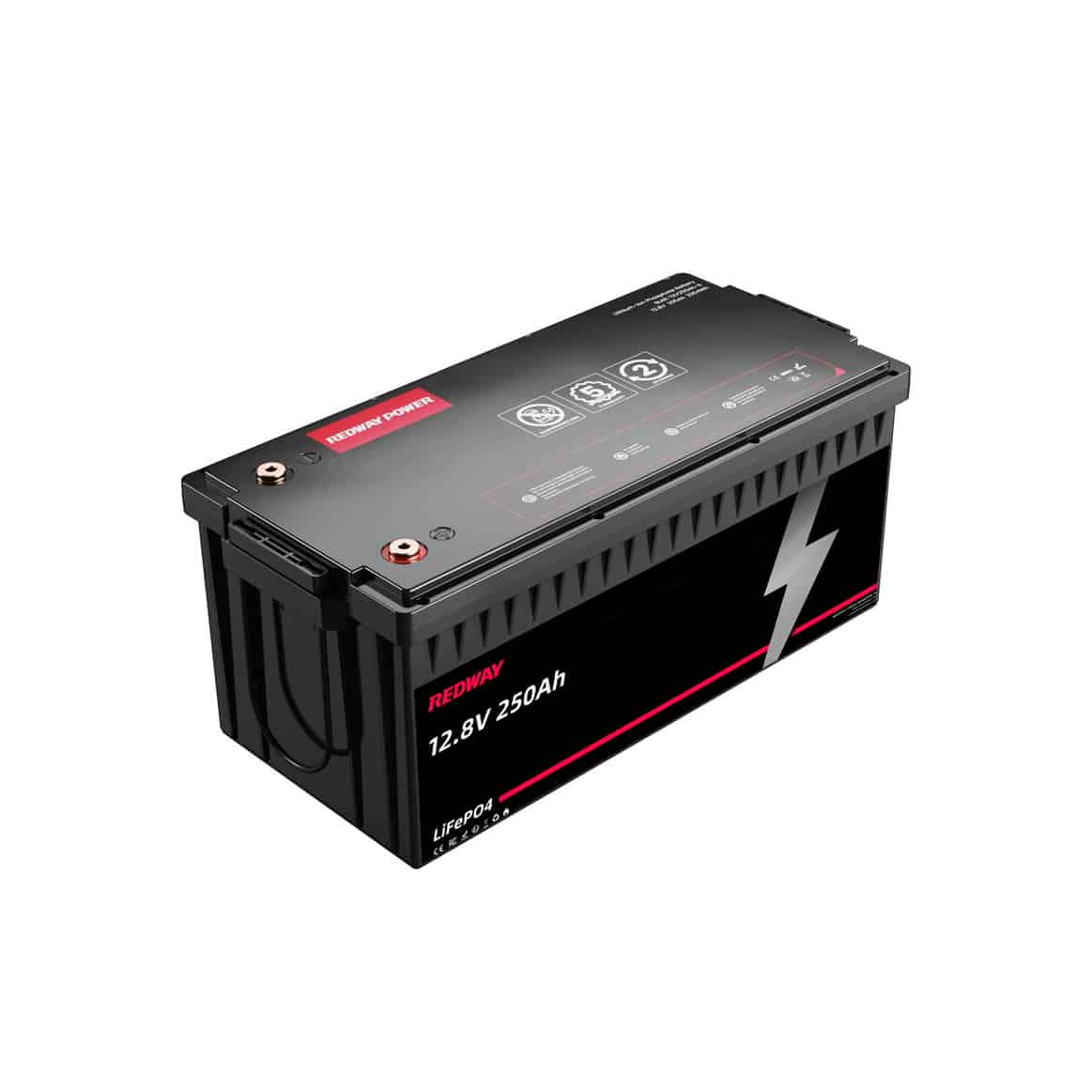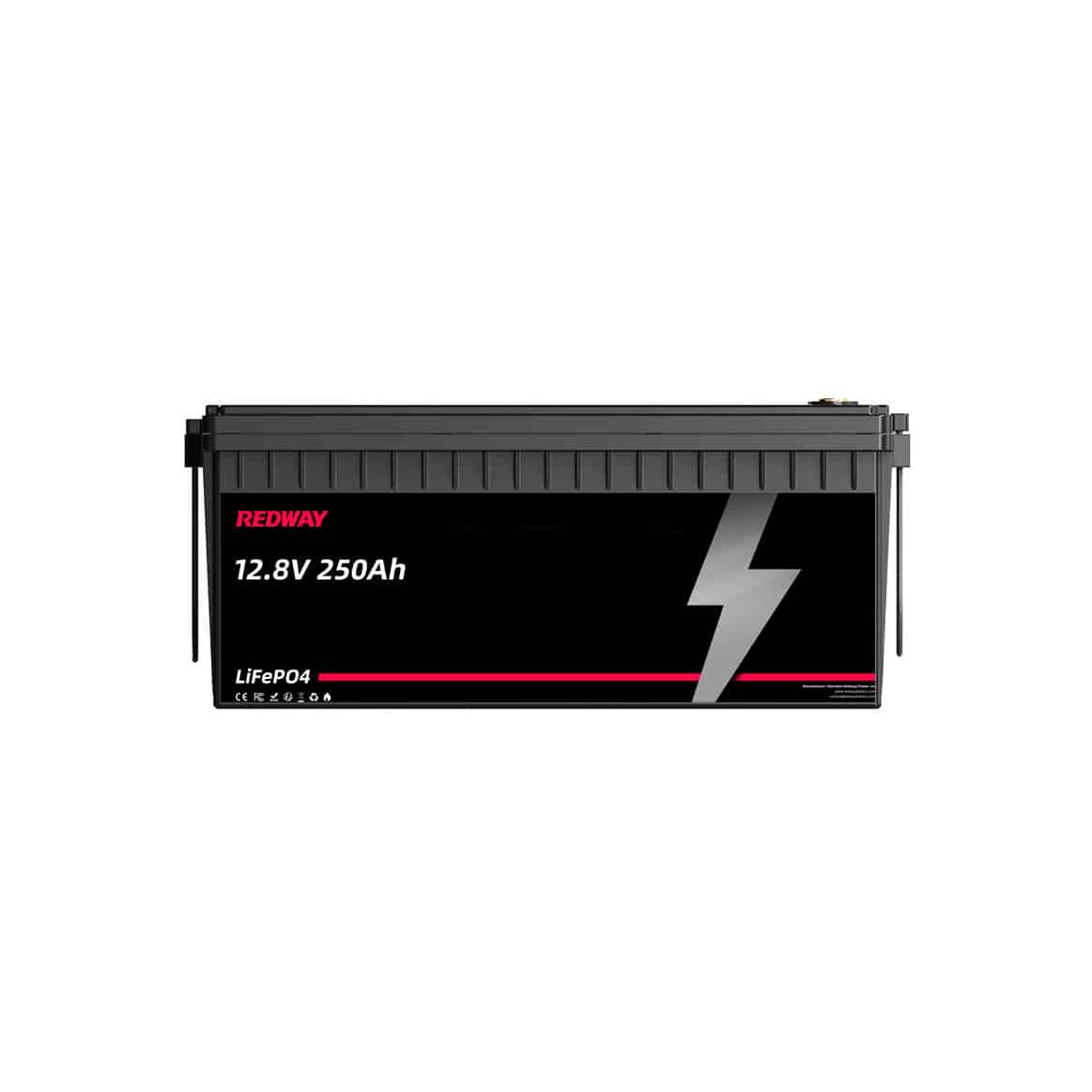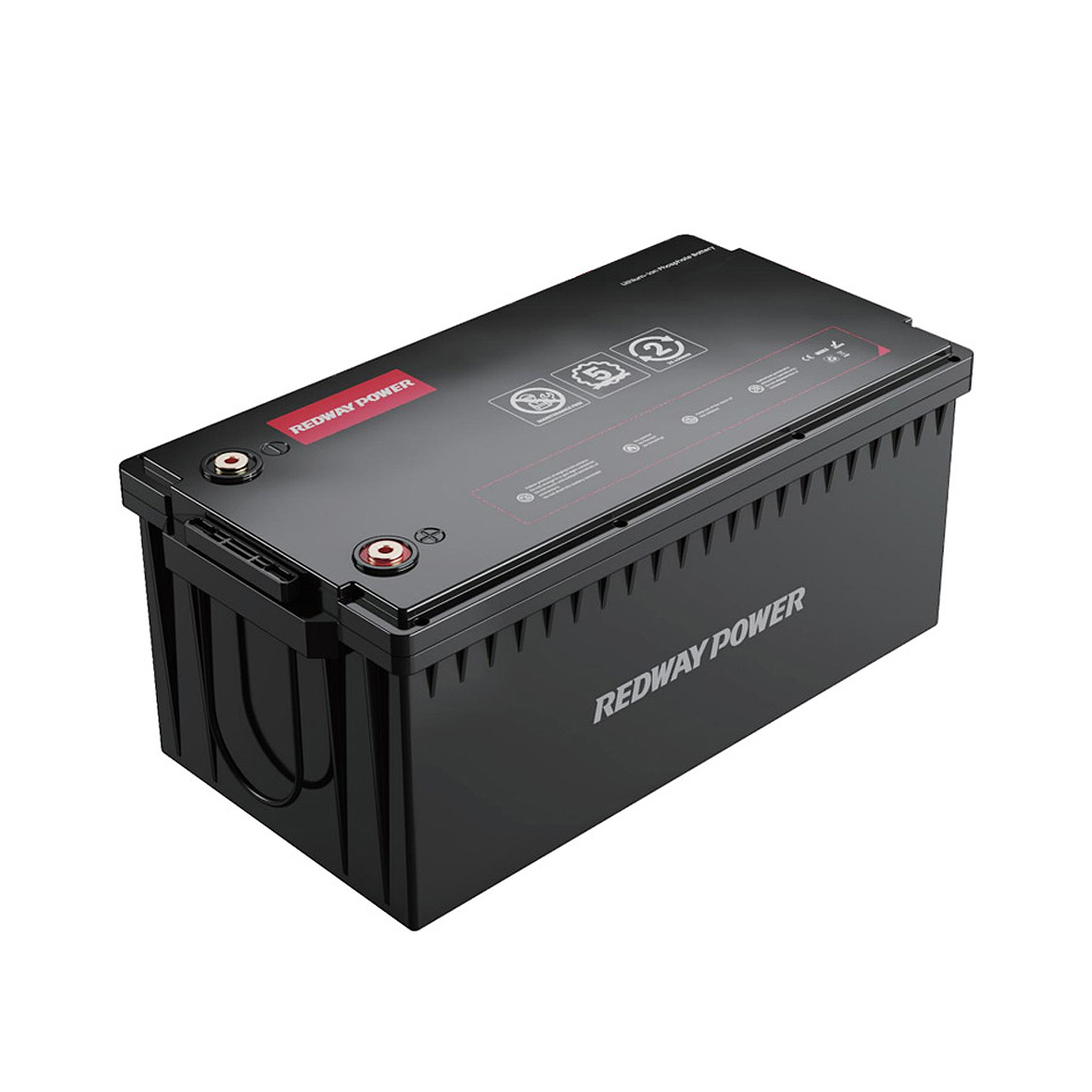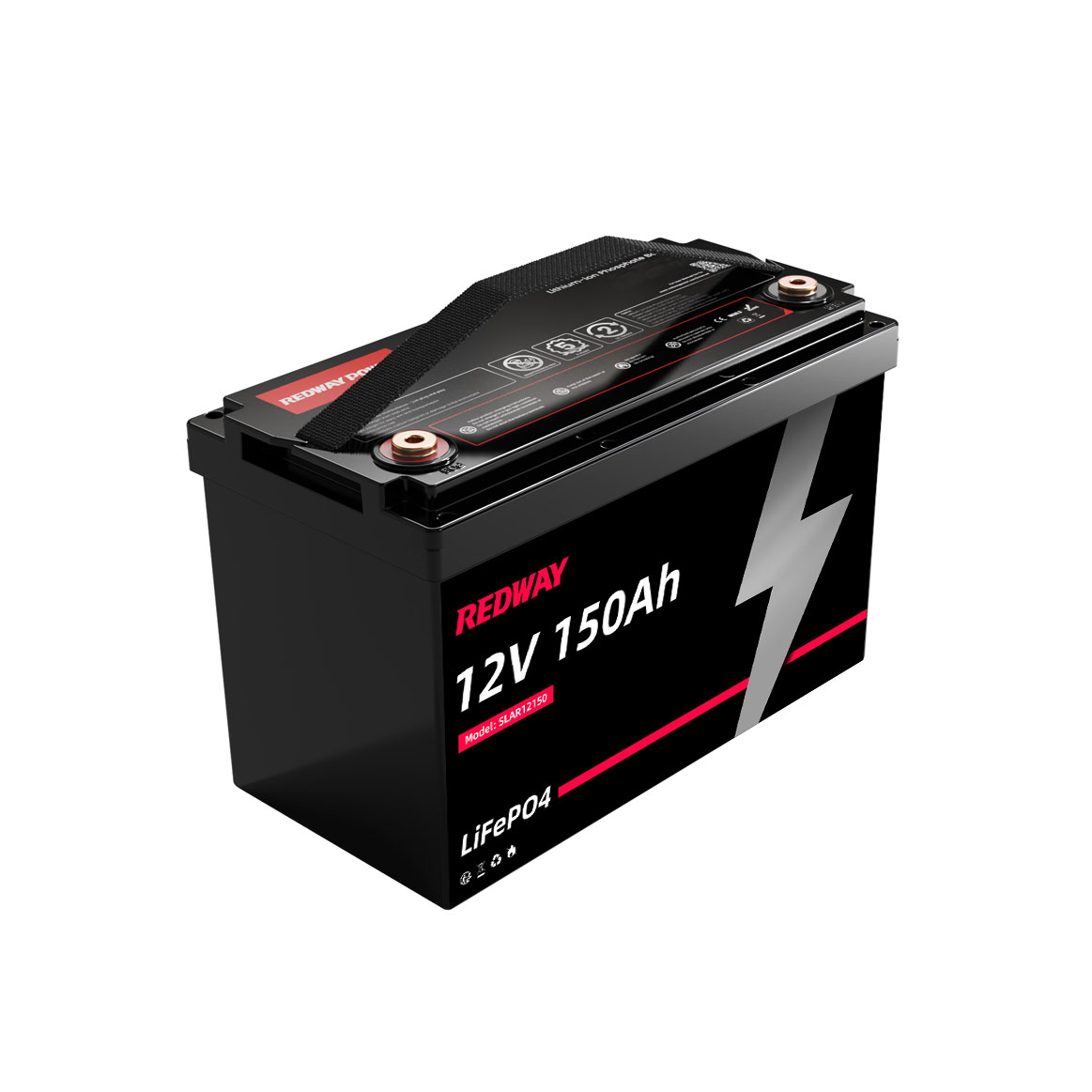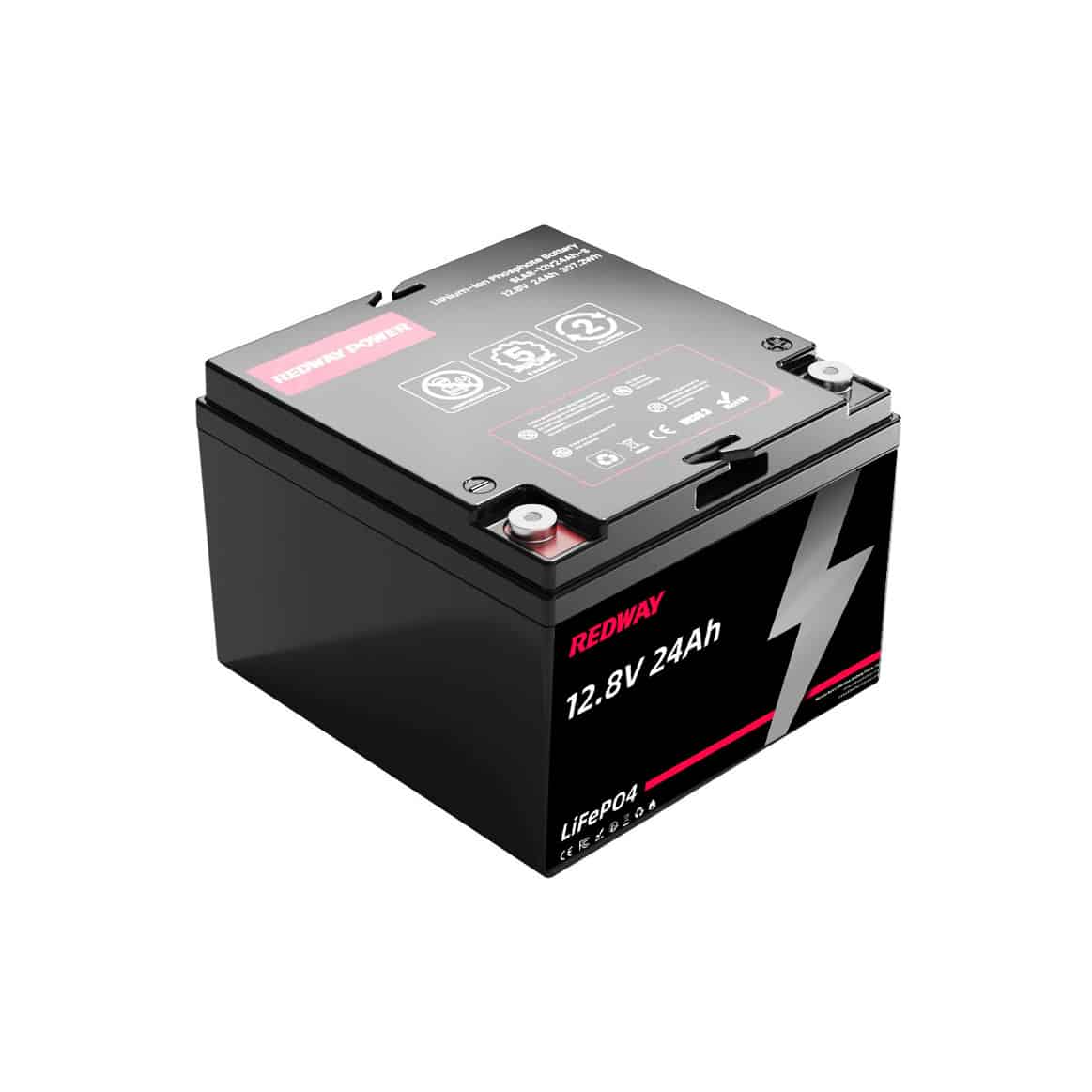Description
The Redway 12V 250Ah Lithium Battery is a premium energy storage solution designed specifically for B2B wholesalers and importers seeking high-capacity, durable lithium batteries. Built with advanced LiFePO4 (Lithium Iron Phosphate) technology, this battery delivers an impressive 3200Wh (3.2 kWh) of clean, efficient power—ideal for solar energy systems, RVs, marine applications, and backup power setups.
With a robust nominal voltage of 12.8V and a large capacity of 250Ah, this battery supports continuous charge and discharge currents up to 200A, ensuring dependable performance even under demanding loads. Its compact dimensions and lightweight design (approximately 21 kg) make installation and transport simple and hassle-free.
Equipped with a high-quality JBD/DALY Battery Management System (BMS), the Redway 12V 250Ah battery offers comprehensive protection against overcharging, overheating, and short circuits, ensuring maximum safety and longevity. It operates efficiently across a wide temperature range—from 0°C to 60°C for charging and -20°C to 65°C for discharging—making it versatile for diverse environments.
This battery supports up to 6 units in parallel, enabling scalable energy solutions tailored to customer needs. Optional upgrades such as Bluetooth monitoring, GPS tracking, self-heating, and LCD display provide enhanced functionality. Certified to international standards including UL1642, IEC62619, CE, and UN38.3, the Redway 12V 250Ah Lithium Battery guarantees safe, reliable power for your customers.
Know More
The 12V 250Ah LiFePO4 Lithium Battery delivers 3.2kWh of energy, over 6,000 cycles, and advanced BMS safety in a robust, lightweight form. Redway Battery’s OEM/ODM expertise, rapid delivery, and global certifications make it the premier choice for RV, marine, solar, and industrial energy storage at wholesale scale.
What Are the Key Features and Specifications of the 12V 250Ah LiFePO4 Battery?
The 12V 250Ah LiFePO4 battery features a nominal voltage of 12.8V, 250Ah capacity, and 3,200Wh energy output. It weighs only 25kg, supports high continuous current, and operates from -20°C to 65°C. The durable ABS shell and advanced BMS ensure safety, while the self-discharge rate is less than 2% per month.
Chart: Key Specifications of 12V 250Ah LiFePO4
| Feature |
Value |
| Nominal Voltage |
12.8V |
| Capacity |
250Ah |
| Energy |
3,200Wh |
| Cycle Life |
6,000+ cycles @ 80% DoD |
| Operating Temp |
-20°C to 65°C |
| Weight |
25kg |
| Max Discharge Current |
100A–150A |
| Case |
ABS Plastic |
| Certifications |
CE, IEC, UN38.3, MSDS, UL |
How Does the 12V 250Ah LiFePO4 Battery Ensure Safety and Reliability?
This battery is equipped with a sophisticated BMS that provides real-time monitoring and protection against overcharge, overdischarge, overcurrent, short circuits, and overheating. The robust ABS casing is fire-resistant, and the battery is engineered for safe operation in extreme temperatures and demanding conditions.
Which Applications Are Best Suited for the 12V 250Ah LiFePO4 Battery?
The 12V 250Ah LiFePO4 battery excels in RVs, marine vessels, off-grid solar systems, backup power, and commercial vehicles. Its deep-cycle capability, high discharge current, and maintenance-free design make it ideal for both mobile and stationary power needs.
Why Is LiFePO4 Chemistry Preferred for Factory Wholesale Batteries?
LiFePO4 chemistry offers superior thermal stability, long cycle life, and high safety compared to lead-acid and other lithium-ion types. It resists thermal runaway, supports deep cycling, and maintains over 80% capacity after thousands of cycles, making it the top choice for demanding and mission-critical applications.
How Does Redway Battery Support OEM, ODM, and Wholesale Needs?
Redway Battery provides full OEM/ODM services, allowing customization of voltage, capacity, case design, and branding. With advanced manufacturing in Dongguan and Huizhou, Redway delivers flexible solutions, fast lead times (20 days), and global logistics for wholesale and B2B clients.
What Certifications and Standards Does the 12V 250Ah LiFePO4 Battery Meet?
The battery is certified to CE, IEC62619, UN38.3, MSDS, and UL standards, ensuring compliance with global safety, transport, and environmental requirements. These certifications guarantee reliability, safe installation, and acceptance in international markets.
How Does the 12V 250Ah LiFePO4 Battery Compare to Lead-Acid and Other Lithium Batteries?
Compared to lead-acid, the 12V 250Ah LiFePO4 battery is 60–70% lighter, lasts 5–10 times longer, and delivers higher energy density. It is maintenance-free, supports fast charging, and offers a much lower total cost of ownership.
Chart: LiFePO4 vs. Lead-Acid Battery Comparison
| Feature |
LiFePO4 (250Ah) |
Lead-Acid (250Ah) |
| Cycle Life |
6,000+ cycles |
400–800 cycles |
| Weight |
25kg |
70kg+ |
| Maintenance |
None |
Regular |
| Depth of Discharge |
80% |
50% |
| Energy Density |
High |
Low |
Can the 12V 250Ah LiFePO4 Battery Be Used in Series or Parallel for Larger Systems?
Yes, up to four batteries can be connected in series for 48V systems or in parallel for higher capacity. This modularity supports scalable energy storage for solar, backup, and mobile applications, enabling configurations up to 51.2V 1,000Ah or more.
What Factors Affect Pricing for OEM and Wholesale LiFePO4 Batteries?
Pricing depends on raw material costs, production volume, BMS complexity, and certifications. High-purity lithium iron phosphate, smart battery management features, and enhanced safety protections increase costs. Bulk orders and long-term supplier agreements often secure lower unit prices.
How Do You Evaluate a Reliable 12V 250Ah Battery Supplier?
Look for certifications, production capacity, customer reviews, and warranty policies. Redway Battery stands out with international certifications, strict quality control, a 10-year warranty, and a history of positive feedback from global clients.
Redway Battery Expert Views
“Our 12V 250Ah LiFePO4 battery is engineered for maximum performance, safety, and versatility. With advanced BMS, robust construction, and full OEM/ODM support, Redway Battery delivers reliable solutions for RV, marine, solar, and off-grid energy storage worldwide.”
— Dr. Mei Zhang, Senior Engineer, Redway Battery
Conclusion
The 12V 250Ah LiFePO4 Lithium Battery stands out for its safety, long cycle life, and modular design. Redway Battery’s OEM expertise, global certifications, and rapid delivery make it the premier choice for wholesale, custom, and industrial energy storage needs.
FAQs
Q: What is the cycle life of the 12V 250Ah LiFePO4 battery?
A: Over 6,000 cycles at 80% DoD, with a 10-year design life.
Q: Can the battery be customized for specific projects?
A: Yes, Redway Battery offers OEM/ODM services for capacity, case, and branding.
Q: Is the 12V 250Ah battery compatible with solar and marine systems?
A: Yes, it integrates seamlessly with solar, marine, RV, and off-grid setups.
Q: What safety features are included?
A: Advanced BMS, ABS casing, fire-resistant materials, and full short-circuit protection.
Q: How quickly can orders be delivered?
A: Standard delivery is 20 days for bulk orders, with global shipping options.


